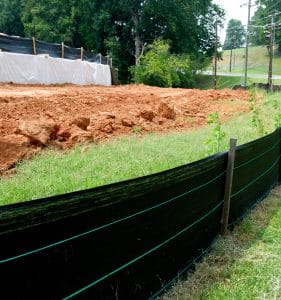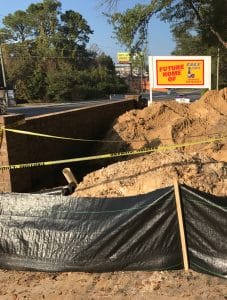Unraveling the Differences: Certified Construction Stormwater Inspector Versus Non-Certified
Intro
In the world of construction stormwater management, the role of inspectors is crucial in ensuring compliance with regulations and best practices. When it comes to construction stormwater inspections, the difference between a certified construction stormwater inspector and a non-certified inspector can have significant implications. Let’s delve into the distinctions between the two and explore why certification matters in stormwater management.
The Role of Construction Stormwater Inspectors
At the heart of effective construction stormwater management lies the critical role of construction stormwater inspectors. These professionals are tasked with a comprehensive suite of responsibilities designed to safeguard waterways from the impacts of construction activities. Through diligent monitoring and enforcement of stormwater management practices, inspectors ensure that construction sites adhere to essential environmental protection standards.
A key responsibility of construction stormwater inspectors is the execution of regular site inspections. This involves a thorough examination of the site to identify any practices that may contravene established stormwater management protocols. Inspectors scrutinize various aspects of a construction project, including the implementation of erosion and sediment control measures, the maintenance of pollution prevention practices, and the overall adherence to site-specific stormwater pollution prevention plans (SWPPPs).
In the event that potential issues or violations are detected, inspectors are charged with recommending or initiating corrective actions. This might involve consulting with site managers to address minor compliance issues or, in more serious cases, escalating the matter to ensure that significant environmental impacts are averted. The aim is to prompt timely interventions that mitigate potential harm to water bodies and align construction practices with regulatory expectations.
Moreover, inspectors serve as crucial advisers to construction project teams, offering guidance on best practices for stormwater management. Their expertise enables them to recommend strategies and measures that enhance site compliance and environmental stewardship. This advisory role is particularly critical in navigating the complexities of local, state, and federal stormwater regulations, ensuring that projects proceed without unintentional breaches of environmental laws.
Ultimately, construction stormwater inspectors act as guardians of water quality, leveraging their specialized knowledge and skills to foster sustainable construction practices. Their proactive oversight is instrumental in preventing pollution, preserving aquatic ecosystems, and promoting compliance with the multifaceted regulatory landscape governing construction activities. Through their vigilant efforts, inspectors contribute significantly to the broader goal of environmental protection, ensuring that construction projects progress responsibly and in harmony with natural water resources.
Competencies of Certified Versus Non-Certified Inspectors
The distinction in competencies between certified construction stormwater inspectors and their non-certified counterparts is pronounced, primarily due to the depth and breadth of training involved. Certified inspectors have successfully completed a comprehensive certification program that covers all facets of stormwater management, including but not limited to, erosion and sediment control, pollution prevention, and a thorough understanding of both federal and state regulations.  This education equips them with a robust toolkit of strategies and best practices, allowing them to effectively manage complex stormwater issues on construction sites.
This education equips them with a robust toolkit of strategies and best practices, allowing them to effectively manage complex stormwater issues on construction sites.
In contrast, non-certified inspectors might not have had the same rigorous training and therefore may lack the nuanced understanding of stormwater management principles. While they might be familiar with basic concepts, their ability to navigate the more complex aspects of stormwater inspections, such as interpreting nuanced regulatory requirements or implementing advanced erosion control measures, might be limited. This disparity in competencies can lead to differences in the quality of inspection and management of stormwater on construction projects.
A key competency of certified inspectors is their adeptness in identifying potential stormwater compliance issues before they escalate into more serious problems. Their training includes scenario-based learning that prepares them to anticipate and mitigate a wide range of potential issues. Additionally, their understanding of the legal and regulatory landscape enables them to provide valuable guidance to construction project managers, ensuring that projects remain in compliance while also minimizing environmental impact.
Moreover, certified inspectors are trained in the latest stormwater management technologies and practices. This knowledge allows them to recommend innovative solutions that can improve the efficiency of stormwater management efforts on construction sites. Their commitment to ongoing education also means they remain current with changes in regulations and emerging best practices, further enhancing their effectiveness.
A certified construction stormwater inspector plays a crucial role with the construction industry, focusing on safeguarding water quality by ensuring that construction sites adhere to stormwater management and sediment control regulations.
These professionals are legally trained in inspection and compliance. Their responsibilities include diligent inspection and enforcement of stormwater regulations, ensuring that construction sites implement effective erosion and sediment control measures.
Additionally, they advocate for the adoption of bet management practices tailored to each construction site’s specific needs, promoting sustainable construction practices. 
On the other hand, a non-certified inspector lacks the formal certifications and training required for this role. While they may still perform inspections, their expertise and understanding of stormwater management techniques may be limited. Without certification, they may not have the same level of authority or knowledge to enforce compliance with stormwater regulations.
In summary, the key difference between a CERTIFIED construction inspector and a NON-Certified inspector lie in their legal training, understanding of stormwater management and ability to effectively communicate with various stakeholders involved in construction projects. Certified inspectors are much better equipped to protect water quality and ensure compliance with environmental regulations.
In sum, the competencies of certified construction stormwater inspectors surpass those of non-certified inspectors significantly. Their extensive training, combined with a commitment to professional development, makes them indispensable assets in the pursuit of environmentally responsible construction practices and regulatory compliance.
Understanding Certification for Stormwater Inspectors
Embarking on the journey to become a certified construction stormwater inspector signifies a pivotal commitment to excellence in environmental stewardship within the construction industry. The process to achieve certification is rigorous, designed to equip inspectors with a comprehensive understanding of the nuances and complexities of stormwater management. This certification journey entails engaging in a structured program that spans a range of critical topics, from the foundational principles of erosion and sediment control to the intricacies of pollution prevention techniques and a deep dive into the mosaic of regulatory requirements that govern construction activities.
According to the Stormwater Training Center, the pathway to certification is marked by a series of educational milestones, culminating in an examination that tests the candidate’s mastery of stormwater management principles and their practical application in the field. The curriculum is curated to ensure that aspiring inspectors are well-versed in current best practices and are adept at interpreting and implementing the relevant local, state, and federal regulations that safeguard water quality. This educational endeavor is not merely academic; it involves hands-on training that simulates real-world scenarios, preparing inspectors to confront and resolve potential stormwater management challenges with skill and confidence.
Beyond the technical acumen, the certification process instills a profound respect for the environmental implications of construction activities. It fosters a sense of responsibility among inspectors to serve not only as enforcers of compliance but also as advocates for sustainable construction practices. The knowledge and skills acquired through certification empower inspectors to effectively communicate the importance of stormwater management to construction teams, guiding them toward solutions that minimize environmental impact.
Certification also serves as a professional benchmark, distinguishing certified inspectors as authorities in their field. It signals to employers, regulatory bodies, and the community at large that the inspector has dedicated themselves to achieving a high standard of expertise in stormwater management. This professional recognition is accompanied by an expectation of ongoing learning; certified inspectors are encouraged to stay abreast of emerging technologies, regulatory updates, and evolving best practices through continuing education. This commitment to lifelong learning ensures that certified inspectors remain at the forefront of the field, capable of leading the charge in protecting water resources in the face of dynamic environmental challenges.
The Impact on Construction Projects
The involvement of a certified construction stormwater inspector on construction sites brings a multitude of benefits, directly influencing the success and environmental compliance of projects. Their specialized training and deep understanding of stormwater management practices enable them to swiftly identify and address potential issues that could lead to environmental harm or regulatory penalties. This proactive approach ensures that construction activities proceed smoothly, without the setbacks that can arise from non-compliance with stormwater regulations.
Certified inspectors contribute significantly to the efficiency and effectiveness of stormwater management on construction sites. Their expertise allows for the early detection of potential problems, facilitating prompt and appropriate corrective actions. This not only helps in avoiding costly fines and delays but also in maintaining the project’s reputation and its adherence to environmental protection standards. The guidance provided by these inspectors is invaluable, aiding construction teams in implementing best practices and innovative solutions that enhance the sustainability of the project.
Their role extends beyond mere compliance checks; certified inspectors are instrumental in fostering a culture of environmental responsibility within construction teams. They serve as educators and advisors, helping project managers and crews understand the importance of stormwater management and the impact of their work on local waterways and the wider ecosystem. This educational aspect contributes to a more informed and conscientious approach to construction activities, benefiting both the project and the environment.
The presence of a certified inspector on a project signals a commitment to high standards of environmental stewardship and regulatory compliance. It reassures stakeholders, including clients, regulatory bodies, and the community, that the project prioritizes the protection of water resources. In essence, certified construction stormwater inspectors play a pivotal role in bridging the gap between construction activities and environmental conservation goals, ensuring that projects not only achieve their objectives but do so in a manner that respects and preserves the natural environment.
Why Certification Matters in Stormwater Management
The significance of certification in stormwater management transcends mere acknowledgment of expertise; it embodies a pledge to the highest standards of environmental protection and regulatory adherence. Individuals achieving certified construction stormwater inspector status have demonstrated not only their mastery of complex regulatory frameworks and stormwater management practices but also their dedication to continuing education and improvement. This commitment ensures that they are always equipped with the latest knowledge and techniques to address the evolving challenges of managing stormwater on construction sites effectively.
Holding a certification distinguishes inspectors in the field, offering a mark of reliability and professionalism that stakeholders—ranging from construction companies to government agencies—value highly. It reassures these stakeholders that certified inspectors are proficient in identifying, preventing, and addressing potential stormwater management issues, thereby safeguarding water quality and contributing to the success of construction projects within environmental compliance frameworks.
Furthermore, certification fosters a culture of excellence and accountability in the construction industry. It encourages a proactive approach to stormwater management, where certified inspectors lead by example, promoting best practices and innovative solutions that minimize environmental impacts. Their role is instrumental in elevating industry standards, guiding construction projects towards more sustainable and responsible outcomes.
In essence, certification matters in stormwater management because it is a testament to an inspector’s unwavering commitment to environmental stewardship and professional integrity. It ensures that those responsible for overseeing the complex interplay between construction activities and water resource protection are fully capable of navigating this critical task, thereby making a substantial contribution to the preservation of our natural environment for future generations.
The Legal and Regulatory Framework
Navigating the legal and regulatory landscape is a fundamental aspect of the work undertaken by construction stormwater inspectors. The mosaic of laws and regulations that govern stormwater management on construction sites is extensive and multifaceted, reflecting the importance of protecting water resources in the face of development pressures. At the federal level, the Clean Water Act (CWA) serves as the cornerstone of stormwater regulation, establishing the National Pollutant Discharge Elimination System (NPDES) permit program. This program mandates that construction activities that disturb one or more acres of land (or less if part of a larger common plan of development) obtain permits that set forth standards for stormwater discharges.
State and local authorities often build upon federal regulations, tailoring requirements to address the unique environmental concerns and hydrological conditions of their jurisdictions. These localized regulations can vary significantly from one area to another, sometimes imposing stricter standards or additional oversight mechanisms. For instance, certain states or municipalities may require the development and implementation of a comprehensive Stormwater Pollution Prevention Plan (SWPPP) beyond what is stipulated at the federal level.
Understanding this complex regulatory framework is imperative for both certified and non-certified construction stormwater inspectors. However, certified inspectors are typically better equipped to navigate these complexities thanks to the extensive training they receive as part of their certification process. Their education covers not only the broad strokes of federal legislation like the CWA but also delves into the nuances of state and local requirements. This knowledge enables them to ensure that construction projects are in full compliance with all applicable laws and regulations, thereby minimizing the risk of legal violations and potential penalties.
Moreover, certified inspectors are often more familiar with the processes for obtaining necessary stormwater permits and can guide construction project managers through the regulatory maze more efficiently. Their expertise extends to understanding the specific documentation and reporting requirements that must be met to maintain compliance throughout the lifespan of a project. This level of regulatory proficiency underscores the value of certification in fostering a proactive approach to environmental protection within the construction industry.

